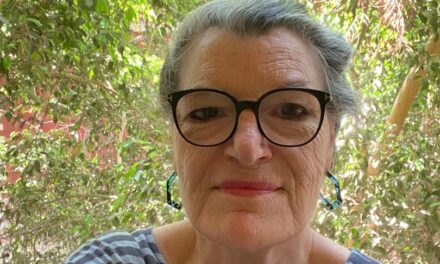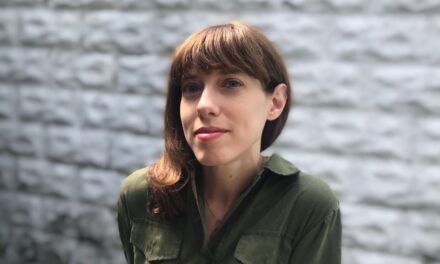
Associate Editor Taylor Byas: In Dawn Miller’s “Probability Statistics,” two unlikely worlds collide as the narrator plays a game of Wordle while waiting for a mammogram. And in this waiting room purgatory, we begin to see how things are always more connected than we think. Miller brilliantly probes the probabilities of letters and language, and in doing so, she reminds us of the very real possibilities that our own bodies might turn against us and fail.
To hear Dawn read her story, click here:
Probability Statistics
The door beneath the Mammography sign swings open. A woman rises from one of the blue vinyl chairs in the waiting room and enters, swallowed alive by the doorway’s dark maw. We must exit someplace different; I’ve yet to see anyone leave. Maybe two exits exist, one leading to the sunny outside, the other to a different room, a smaller room, a room with soft light and quiet voices.
There were eight of us to start, now four, each perched one chair apart, ankles crossed, eyes averted, like waiting for some life-altering interview, although in this case, none of us wants the job.
I type “daily Wordle” in the search engine on my phone. A blank grid appears.
- There are more than 2,315 five-letter possibilities in the game’s database. In theory, thousands more exist, but people would get ticked off with answers like ergot, soare, or Ouija.
- At one word a day, Wordle will last over six years without a repetition.
- No one knows what will happen after that. Will the words shuffle and start over? Circle back to the start of the list? Or morph to include four- or six-letter solutions? Or perhaps end completely?
- Vanish.
- Poof.
- Bottom line, the game can’t last forever.
I enter SMART, the word I start with each day now. I got the puzzle on the first try a few months ago, although I don’t remember which word. That was some sort of lottery win, right? A defiance of statistics? Now, I stick to the same first guess. There’s comfort in knowing what’s coming.
- Everyone on the planet gets the identical daily word. Canada. India. Kenya. The win/lose probability is equal. Even the game’s creator, Josh Wardle, doesn’t know what will come next, the answers plucked from a random selection.
Two more women get up and disappear through the door. I enter FAVOR on the second line. The game uses American English, not British English. The word looks wrong without the U, like a piece is missing. An arm. A leg. A breast.
- The average woman’s breast cancer risk is about 13 percent, which means about one in eight women will be diagnosed with invasive breast cancer in her lifetime.
Another woman is called, and I’m alone.
On my last try, I give up and enter SMART again just to get the final answer. The door swings open, and a blue-clad technician curls a finger at me. I tuck the phone into my purse, get up, and wonder which door I’ll exit.
Dawn Miller’s short fiction appears or is forthcoming in The Forge, Stanchion, Fictive Dream, Brink, Cleaver Magazine, SmokeLong Quarterly, Fractured Lit, Burningword Literary Journal, Typehouse, and Jellyfish Review, among others. Her work has been nominated for a Pushcart Prize. She lives and writes in Picton, Ontario, Canada.
CLICK HERE









